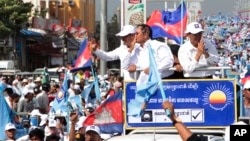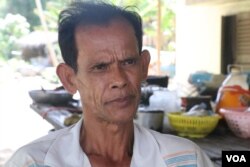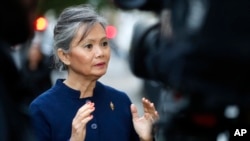Fear has gripped local opposition officials since their party was dissolved by the Supreme Court last year. For former members of the banned Cambodia National Rescue Party, even organizing a private party comes with surveillance and questions from the authorities.
Po Sreynak, a former opposition councilor in Chranouk commune, is one of several ex-CNRP officials who reported that their movements were being watched and their motives questioned, more than a year after the party was outlawed.
The ruling Cambodian People’s Party, led by Prime Minister Hun Sen, bristles with paranoia over the alleged threat of a “color revolution”, even as it has stifled almost all dissenting voices and claimed every seat in parliament in July’s general election.
Sreynak and a group of friends had gathered at her home in Chranouk for “a drinking party” during the Pchum Ben festival last month.
“We had a drinking party with more than 10 people and then one of the participants was questioned the next day by a CPP official,” she said.
“They asked if we met to organize a color revolution,” Sreynak added. “We are watched like prisoners.”
The CNRP was the country’s largest political party and the only party to win seats in parliament in the 2013 election. Its leader, Kem Sokha, was jailed on treason charges shortly before the party was disbanded. He was later placed under house arrest and is still awaiting trial. The CPP claims that Sokha conspired with the United States to overthrow Hun Sen.
‘Communist Leadership Style’
Immediately following the party’s dissolution, the CPP oversaw a purge of CNRP officials, with more than 5,000 local CNRP representatives losing their positions. The opposition had controlled about 30 percent of local authorities and increased its minority share to 43 percent in local elections in summer 2017.
Reports circulated that opposition officials were being pressured into defecting to the CPP, while Hun Sen made a public nationwide call for defections. Many CNRP officials fled the country, fearing arrest, and continued campaigning from abroad. Some 118 CNRP officials were banned from politics for five years as part of the crackdown.
Sreynak said she was asked several times to defect to the CPP, but rejected the advances because it was “against the voters’ will.”
But she says she has stopped her political activities out of fear of what opposition supporters say is widespread surveillance of their activities.
The local authority in Chranouk commune was controlled by the CNRP until the seats were handed to the CPP late last year.
Chou Sam On, 51, the former Kampong Leang district chief, said he and his former colleagues were under near-constant watch by members of the ruling party.
“This is a communist leadership style,” he said. “Everyone is being watched.”
Public support for the CNRP has become risky and, in some cases, illegal, despite the constitution guaranteeing the right to free assembly and association.
Even those with no affiliation with the CNRP say they are wary of openly discussing political ideas under the new regime.
“Villagers are afraid that the local authorities know when they communicate with [former] opposition officials,” Sam On said. “They can be targeted by local authorities.”
A side effect of the surveillance has been a general silencing of political discourse, he added.
Khieu Sopheak, an interior ministry spokesman, claimed there was no official order for officials to monitor opposition officials and supporters. “They can do anything, but it’s important they don’t do illegal things. They don’t meet for social events or business, they meet to topple [the government],” he said, without providing evidence.
False Defections
Former opposition officials who publicly defected to the CPP after the party’s dissolution have said they did so under threat of legal action.
“If I didn’t defect I would be prosecuted and jailed related to the commune election campaign,” one official, who declined to be named due to concerns for their safety, told VOA Khmer.
The official was sued by CPP officials, who claimed $5,000 in damages after the CNRP official took part in a CNRP rally last year.
But the official said since their defection they had effectively stopped participating in politics, which led the CPP to release them from the party.
“After I stopped doing politics, the local authorities didn’t pressure me with anything ... they stopped caring about me.
“In my mind, I still want to be active politically with the CNRP. But now it’s gone. There’s no hope that the CNRP can come back for an election.”
Not an Easy Road
Following the CPP’s landslide election win in July and the move to a de facto one-party system under Hun Sen, relations with the United States and European Union have further deteriorated, but Phnom Penh continues to receive staunch support from China and Vietnam.
Experts doubt whether the CNRP will ever be allowed to return to the Cambodian political arena.
Sophal Ear, an associate professor of world affairs at Occidental College in Los Angeles, said the CNRP “has gone through a lot - whereas other parties would have easily folded by now.”
“I am not optimistic ... I think all of this was done to make sure this never happens. CNRP being allowed to return would be unthinkable. If they are allowed to return, it might be only without Kem Sokha and Sam Rainsy at the helm... which is to say, not the same party at that point.”
Cambodia now faces the prospect of further sanctions from the west and its removal from the EU’s preferential trading scheme, Everything But Arms.
Mu Sochua, a CNRP vice president, said she thought Hun Sen was treading water politically when it came to international sanctions, adding that “when the time comes, he will surrender.”
She said the CNRP still had “high hopes” of a return to politics in Cambodia. Local CNRP officials, she said, continue to communicate. “We have our network and means to communicate at the local levels,” she said.
Paul Chambers, a Southeast Asia expert at Thailand's Naresuan University, said: “Hun Sen knows that he alone is the dominant force in Cambodia and that the scolding of the West about human rights violations cannot harm him, especially since the Chinese and Vietnamese support him absent any conditionality.”
“The CNRP and any serious parliamentary opposition to Hun Sen's CPP will never be allowed to again pose a serious challenge to the ruling regime. International pressure, though weak, is the only current form of pressure which can be exerted against Hun Sen,” he said.
“Cambodia has now become a completely personalized dictatorship under Hun Sen,” he added.
Sam On said he and his colleagues still hope that the party will be reinstated, though the path to this goal is unclear.
“We are waiting for the opportunity when the party comes back,” he said. “If it takes a long time, the supporters will feel tired and forget us.”










